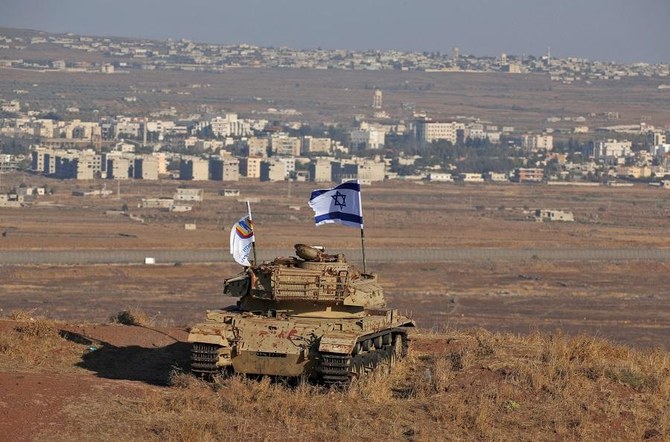BEIRUT: The Gulf Cooperation Council expressed regret on Friday at Donald Trump's call to recognise Israel's sovereignty over the occupied Golan Heights, territory captured from Syria in a 1967 war.
Trump's statement "will not change the reality that (...) the Arab Golan Heights is Syrian land occupied by Israel by military force in 1967," said Abdul Latif Al Zayani, the GCC secretary general.
"The statements by the American president undermine the chances of achieving a just and comprehensive peace."
The GCC's comments came as the Syrian government vowed on Friday to recover the territory from Israel. Other countries, both Syria's allies and enemies, in the region and the West also condemned the US president's comments - which marked the latest major US policy shift on Israel.
Israel captured the Golan Heights from Syria in the 1967 Middle East war and annexed in 1981 — a move not recognized internationally.
Here are the reactions to Trump's statement:
Gulf Cooperation Council
The Gulf Cooperation Council regional group of six Arab countries expressed regret on Friday at US President Donald Trump’s call to recognize Israel’s sovereignty over the Golan Heights, territory captured from Syria in a 1967 war.
Trump’s statement “will not change the reality that (...) the Arab Golan Heights is Syrian land occupied by Israel by military force in 1967,” said Abdul Latif Al Zayani, the GCC secretary general.
“The statements by the American president undermine the chances of achieving a just and comprehensive peace.”
European Union
The European Union underlined it does not recognize Israel’s sovereignty over the Golan Heights on Friday.
“The position of the EU has not changed,” an EU spokeswoman told Reuters. “The European Union, in line with international law, does not recognize Israel’s sovereignty over the territories occupied by Israel since June 1967, including the Golan Heights and does not consider them to be part of Israel’s territory.”
Egypt
Egypt also said on Friday it considers the territory as occupied Syrian land.
In a statement carried by state news agency MENA, the Egyptian Foreign Ministry cited U.N. Security Council resolution 497 of 1981 which rejected Israel's annexation of the territory.
The ministry “stressed the importance that everybody should respect the resolutions of international legitimacy and the United Nations Charter in respect of the inadmissibility of acquiring land by force,” the statement said.
Iraq
In a tweet, Iraq’s foreign ministry said the US call for Israeli sovereignty on Golan Heights contravenes international law.
France
The French Foreign Ministry said the sovereignty of Israel over the Golan Heights would be contrary to international law.
Germany
The Golan Heights is Syrian territory occupied by Israel, a German government spokeswoman said on Friday when asked about U.S. President Donald Trump's call to recognize Israeli sovereignty over the strategic territory.
“If national borders should be changed it must be done through peaceful means between all those involved,” spokeswoman Ulrike Demmer said of the Golan Heights, which Israel captured in the 1967 Middle East war.
“The government rejects unilateral steps.”
Iran, Russia, and Turkey
Russia and Iran, military allies of Damascus, condemned the shift toward recognition — comments which the Syrian government said showed Washington’s “blind” pro-Israeli bias.
“The Syrian nation is more determined to liberate this precious piece of Syrian national land through all available means,” the Syrian state news agency cited an official source as saying.
The Golan Heights would remain “Syrian, Arab,” it said, saying the statement showed contempt for international law.
Turkey, a US-allied state and an adversary of the Damascus government, also criticized the move, saying it had brought the Middle East to the edge of a new crisis and the legitimization of the occupation of the Golan Heights could not be allowed.
“US President Trump’s unfortunate statement yesterday has brought the region to the brink of a new crisis,” Turkish President Tayyip Erdogan said.
Iran said the US position was illegal and unacceptable, and Russia said a change in the status of the Golan Heights would be a direct violation of UN resolutions.
US Secretary of State Mike Pompeo, who is touring the region, is due in Beirut on Friday where he will he will meet political allies of the powerful, Iran-backed Hezbollah, including President Michel Aoun.
Both Iran and Russia have deployed forces into Syria in support of President Bashar Assad during the Syrian conflict, with Iran sending both its own forces and also backing regional Shiite militias such as Lebanon’s Hezbollah that have helped Damascus.
“This illegal and unacceptable recognition does not change the fact that it belongs to Syria,” an Iranian foreign ministry spokesman was cited as saying by state TV.
In a speech at a meeting of the Organization of Islamic Cooperation, Turkey’s Erdogan said: “we cannot allow the legitimization of the occupation of the Golan Heights.”
Arab League
The Arab League, which suspended Syria in 2011, said Trump’s comment paved “the way for official American recognition” of Israeli sovereignty over the Golan Heights.
Arab League Secretary General Ahmed Aboul Gheit said the statements were “completely beyond international law.”
Israeli Prime Minister Benjamin Netanyahu has pressed the United States to recognize its claim and raised that possibility in his first White House meeting with Trump in February 2017.
Trump’s statement has given a boost to Netanyahu in the middle of his re-election campaign.
Netanyahu has praised Trump for “making history” with the statement.
“After 52 years it is time for the United States to fully recognize Israel’s Sovereignty over the Golan Heights, which is of critical strategic and security importance to the State of Israel and Regional Stability!” Trump wrote on Twitter on Thursday.
Trump’s move followed the US recognition in December 2017 of Jerusalem as Israel’s capital — a decision that also drew international criticism as the disputed city’s status remains at the heart of the Israel-Palestinian conflict.















